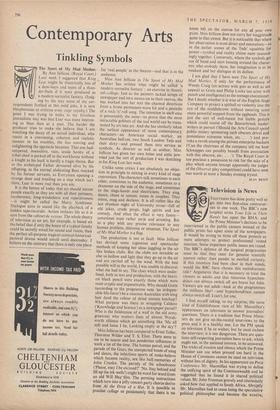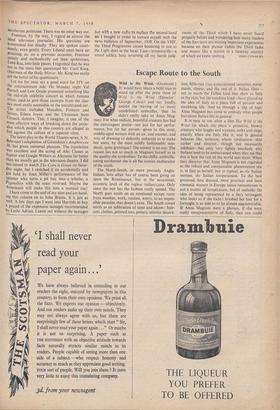Television is News
TELEVISION has done pretty well to get into two first-class controver- sies in one week. The BBC's new hospital series Your Life in Their Hands has upset the BMA; and the Prime Minister's decision to be interviewed in the public camera instead of the public prints has upset some of the newspapers. It would be wrong to write off these protests as mere attempts to protect professional vested interests. Some important public issues are raised. The BBC's defence of the surgical programmes must be that they cater for genuine scientific interest rather than pander to morbid curiosity. If this intention had been clear in their minds, would the BBC have chosen this melodramatic title? Arguments that it is necessary to treat the viewers as adults and that timorous hypochon- driacs can always switch off are brave but false. Viewers are not adult—look at the programmes the millions like !—and hypochondriacs cannot always switch off. I can't, for one.
find myself taking, to my surprise, the same kind of Establishment view of Mr. Macmillan's appearances on television to answer journalists' questions. There is a tradition that Prime Minis- ters do not give op-the-record interviews to the press and it is a healthy one. Let the PM speak on television if he so wishes; but he must eschew the interview; it is too dangerous. There are ques- tions self-respecting journalists have to ask, which ought not, in the national interest, to be answered. The tricks of evasion and silence which the Prime Minister can use when pressed too hard in the House of Commons cannot be used on television without loss of dignity. In his appearance on Press Conference Mr. Macmillan was trying to define the unifying spirit of the Commonwealth and he suggested that he found it in shared political values. Mr. John Freeman gravely and courteously asked how that applied to South Africa. Abruptly Mr. Macmillan had to cease being the speculative political philosopher and become the evasive,
incoherent politician. There was no other way out.
Freeman, by the way, I regard as almost the ideal television journalist. His questions are economical but deadly. They are spoken court- eously, even gently. Every Liberal must have sat groaning as, on a previous occasion, Freeman quietly and methodically cut their spokesman, Lord Rea, into little pieces. I regretted that he was not in the team that questioned Mr. Cecil King, chairman of the Dailty Mirror. Mr. King too easily got the better of his questioners.
Let me for once say a good word for ITV on the entertainment side. On Monday night Val Parnell and Lew Grade presented something like the old-style celebrity concert in which famous artists used to give those excerpts from the clas- sics most easily accessible to the uncultivated ear. The artists included Menuhin, Fonteyn and Somes, Eileen Joyce, and the Ukrainian State Cossack dancers. This, I imagine, is one of the most effective ways of breaking down the preju- dice which people in this country are alleged to feel against the culture of a superior class.
The latest play in the World Theatre series, S. N. Behrman's adaptation of Giraudoux's Amphitryon 38, has given universal pleasure. The translation Was excellent and the acting of Alec Clunes as Jupiter and Googie Withers as Alkmena far better than we usually get in the television theatre. I did not intend to watch The Corn is Green on Satur- day night, but I switched it on accidentally and got held by Joan Miller's performance of the spinster who turns a pit boy into a scholar, a PYgmalion with the sexes reversed. Maybe the Americans will make this into a musical too!
I have come to the end of my stint and any hand- ing this column on to John Braine. It is just as well. A few days ago I went into Harrods to buy a pound of the expensive sausages recommended by Leslie Adrian. I came out without the sausages but with a new radio to replace the second-hand set I bought in order to torture myself with the news bulletins of September, 1938. On the VHF, the Third Programme comes bouncing in just as the Light does in the local. I am—temporarily--a sound addict, busy reversing all my harsh judg- ments of the Third which I have never heard properly before and wondering how many readers of the Spectator are missing important experiences because on their prewar radios the Third fades and moans like a station in a faraway country
of which we know nothing. JOHN COWBURN



































 Previous page
Previous page